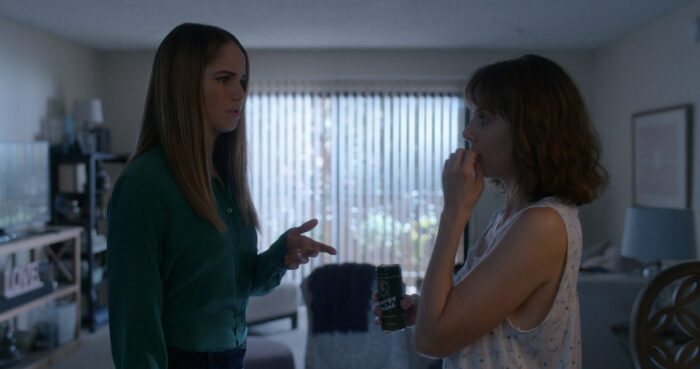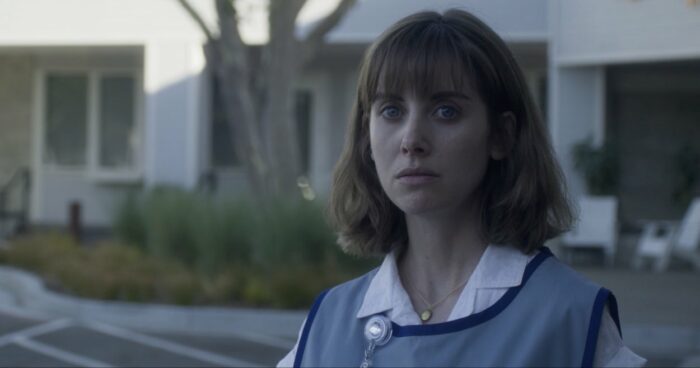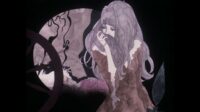If you look back to your high school years, you will probably remember a certain type of girl who existed in the periphery of social cliques, one who spent her lunch hour in the library and who didn’t go to prom. She was someone you barely noticed except for the odd time at the end of the day when you’d see her disappear in a flurry of hair and fabric, running away as fast as she could as soon as the freedom bell rang. This was your school’s horse girl: a girl who felt more connected to animals than humans, who felt more comfortable on a saddle than in social situations. In the Duplass Brothers-produced Horse Girl, director/writer Jeff Baena and star/writer Alison Brie bring this concept to the screen in a thought-provoking meditation on what it feels like to not only be out of place but potentially out of time and space.
The film follows Sarah, a socially-awkward millennial who seems to only enjoy three things: horses, her job at an arts and crafts store, and Purgatory, a procedural television show that is the lovechild of Supernatural, Buffy the Vampire Slayer and Criminal Minds (and features some inspired casting with TV vets Matthew Gray Gubler and Robin Tunney). Sarah lives a monotonous life structured around those three passions and doesn’t stray far beyond them until her roommate (Debby Ryan) sets her up with Darren (John Reynolds), a chance encounter that marks the beginning of a shift in Sarah’s life and psyche. We follow Sarah through Zumba classes, first dates, and alien abductions, all while trying to figure out if what we are seeing is real. Although that synopsis might make the film sound like a zany romantic comedy, Horse Girl is a film that defies genre and cannot be easily placed in any kind of category.

The best way I can describe this film, not in genre but in tone, is as a spiritual sibling to Hereditary, which may sound insane if you’ve seen both films but stay with me. Hereditary is a film about mental illness and familial dysfunction, about the fear that as we age we are destined to become copies of our parents or grandparents. Horse Girl takes this concept and turns it from a site of horror to a site of catharsis, to a world where becoming our ancestors is a comfort rather than a curse.
Although viewers may expect Alison Brie’s character to be a quirky Mary Sue oopsie-daisying her way through life and into the arms of a nerdy leading man, Sarah is anything but. She comes from a long line of troubled women, from her grandmother who talked to walls and died homeless and alone after being kicked out of in-patient care to her mother whose body Sarah found on the bathroom floor after a successful suicide attempt. The fear of succumbing to the same fate laps at Sarah’s heels throughout the whole film before completely washing over her and drowning her in a sea of madness and paranoia.
Sarah’s paranoia stems from the idea that she looks too much like her grandmother for it to just be a familial resemblance. Couple that with episodes of lost time, teleportation, and eerie white rooms, Sarah convinces herself that she doesn’t just look like her grandmother, but that she is her grandmother, a clone created and sent to earth by an alien civilization in order to gather information on humankind – a “human thermometer” using Sarah’s term. It may sound comical by description but watching the storyline play out is heart-wrenching and tragic, and leaves you wishing you could just reach into the screen and help our heroine come back down to earth.

One of the most difficult sequences takes place at the end of the second act, just as the film starts to veer into unexpected territory. It begins between Sarah and an ENT specialist who she visits to cure her frequent, and likely abduction-induced, nosebleeds. At the end of the appointment, Sarah asks if there is a test she can take to see whether or not she is a clone. It is a request asked in earnest and naivety that is met, expectedly, with incredulity and laughter by the doctor who tells her that the only way to find out would be to get the DNA of the person she is a clone of and test it against her own. This suggestion leads Sarah to end her first date with Darren at the cemetery where, armed with nothing but a pair of scissors, she asks him to help her dig up her mom’s body in order to collect her DNA. The sequence is uncomfortable and hard to watch as we see this character that we’ve spent the majority of the film getting to know spiral completely out of control.
These scenes that usher us into the third act of the film show audiences precisely what kind of person Sarah is. She is lonely and impressionable, left to speak to a strange doctor about her worries because she doesn’t have any close friends and is influenced more by television and conspiracy theories than real-life experiences, admitting that rewatching Purgatory is the only thing that got her through the period after her mother’s death, the characters acting as friends and therapists. She shares a synergy with her horse Willow but fails to build a true connection with the human race. Even though her heart is open to the people around her she still feels out of place, like she doesn’t quite belong in the time she’s found herself living in. In the end, Sarah chooses to believe that she isn’t just a clone of her grandmother but that she is, in fact, her grandmother, stolen from the past and transplanted into a different decade. And this belief is easier for her to swallow than to admit to herself that she may be succumbing to the same mental illness suffered by her family’s matriarchal line.
Or is that belief easier for the audience to swallow? Baena and Brie don’t give us a clear answer, instead leaving it up to interpretation whether or not Sarah’s suspicions about her genetic makeup are real or fantasy. And, ultimately, the answer doesn’t matter. The film is, at its core, an allegorical musing on whether inheritance is a form of abduction, on whether our bodies and our minds are our own or subject to the influence of what and who we surround ourselves with.
Horse Girl is a hard film to recommend, as it definitely is not for everyone. It is as if David Lynch made an episode of The X-Files and is in another realm from the Duplass Brothers’ more recent productions. The best part of the film is, without a doubt, Alison Brie’s tour-de-force performance as Sarah. Brie – whose lines are 100% improvised, if you weren’t already impressed enough – blew me away with her gentle, caring approach to her character. Even more impressive is her ability to always ground Sarah in reality, as she feels fully-realized and ordinary even when she is going through the most extraordinary experiences.
The film isn’t perfect; it suffers from some pacing issues and there is a sequence near the end with pink pleated bodysuits that really threw me for a loop and muddied my understanding of the themes. But as someone who sometimes would rather spend time with my pets than with people, who finds solace in fictional characters and worlds during times of struggle, and who also lives with the fear of being abducted by my family’s history of mental illness, Horse Girl hit all the right notes for me and is a movie that will stay with me for a long time.



